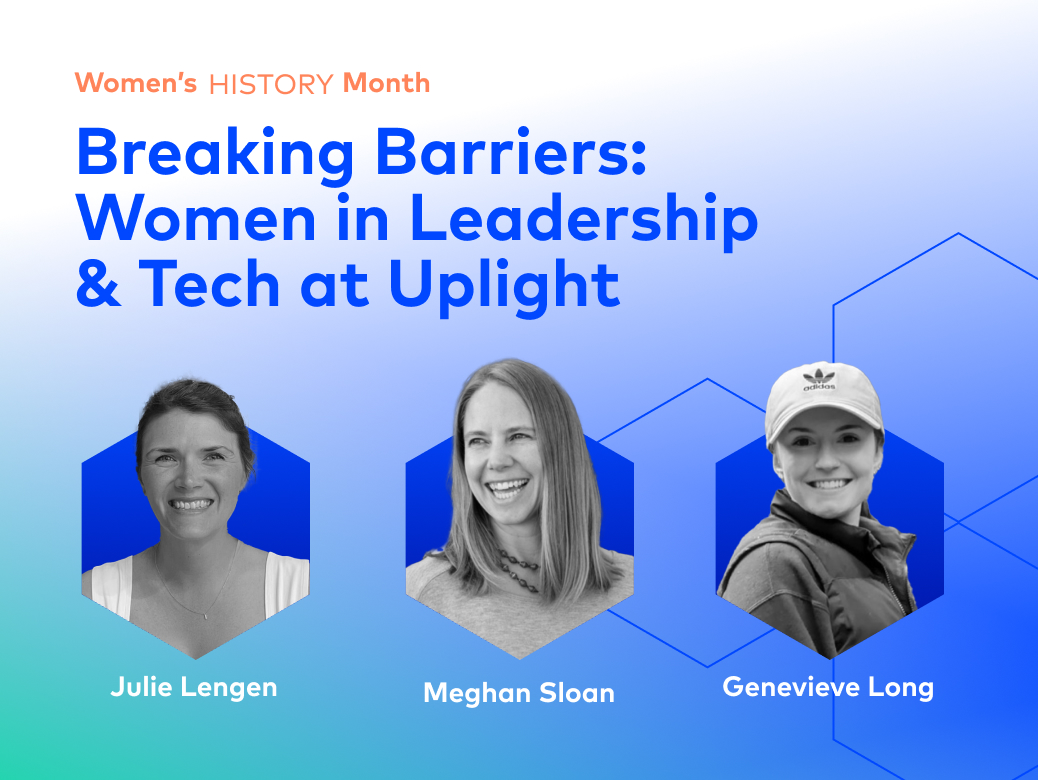As we celebrate Women’s History Month this March, Uplight recognizes the vital contributions women make across our organization. The journey toward gender equity in the tech industry remains ongoing, with women still underrepresented in many technical and executive positions.
We asked three women at Uplight—Julie Lengen, People Operations Manager, Meghan Sloan, Data Science and Reporting Manager, and Genevieve Long, Support & Systems Manager—to share their career journeys, including challenges and words of advice for women aspiring to grow in tech. Each of them brings diverse perspectives and skills that strengthen our mission of creating a more sustainable future.
Your Journey: Can you share a bit about your career path and what led you to Uplight?
Meghan: My path to Uplight has been circuitous. My undergraduate degree is in biochemistry, but after graduation I joined Teach for America where I also earned my masters in education. (As a side note, please thank any teachers you know— it is the hardest job I have ever done). After my commitment was up I headed back to the lab doing various research on reading comprehension software, lungs, and taste, and eventually ended up in the DNA sequencing facility at CU Boulder.
As you can imagine, DNA is big data, and this led me to my calling—I realized that I love coding to figure out what is in the data. After earning a data science certificate I started at Tendril, and have been here ever since. Every time I think I have learned it all, Uplight offers me another challenge. I love the continued growth that this company has provided me.
Gen: My career journey began at the University of Waterloo, where I completed my studies and gained hands-on experience through co-op internships. During COVID, I took time off to reflect on my career path, knowing I wanted to work in tech and for a company making a positive impact on the environment.
I joined Uplight as a Product Operations Associate, initially as a contractor, before transitioning into a full-time Analyst role, then Analyst II, and now a Manager. Being a manager has been incredibly gratifying—I love helping my team succeed, solving strategic challenges, and ensuring our focus stays on the right priorities. At the same time, I’ve enjoyed applying Product Operations principles across different functions, making my work both fulfilling and impactful.
Julie: I have a Hospitality degree with a concentration in Events Management, so my first experience with the tech industry was to book speakers for health IT conferences, being completely unqualified to speak about interoperability with U.S.’s largest healthcare system’s CIOs.
I was ready for a change, so became the Office Manager at a small tech startup. They didn’t have a dedicated HR person so I started slowly taking on that role—until it became my full-time job. Since I was mostly self-taught in HR, I wanted to go to a larger company where I could work directly with other HR professionals.
I was fortunate enough to be hired by Uplight’s current VP of People Ops, Mel, at my next opportunity! I grew with this company as their People Team increased from five to about twenty. I was able to take on a leadership role and wore many hats, becoming more specialized in the process.
My perspective and motivations changed a lot when becoming a new mom in 2023. I thought that if I was going to remain a working mom, I wanted to feel like I was working towards a better future. I was (and am!) very connected to Uplight’s mission and B-Corp status.
I am so fortunate to have stayed in touch with Mel and Uplight had a position that became available that perfectly fit my professional and personal goals.
The Challenges/Barriers Faced: What challenges have you faced as a woman in tech or leadership, and how did you navigate them? OR What’s one moment in your career where you felt you broke through a barrier or paved the way for others?
Meghan: In a previous job, I realized that the amount of stress and responsibility I took on was not worth what I was getting paid, especially considering that after child care expenses, I was netting almost nothing. Negotiating for an increased salary is incredibly difficult, and I have read, especially for women. I was terrified, and had no idea how my manager would react, especially since part of me questioned whether I really deserved an increased salary. But the other part of me knew that the salary needed to increase regardless of who did the job because it was demanding and required a level of expertise beyond what was being paid.
I also realized that in order to move women towards equal pay with men (on average still only 85 cents to the dollar), I had better step up and start negotiating, if not for myself, for other women. After I submitted my request, which was an admittedly bold 40% increase, my manager told me that it would never be accommodated. Shortly after, I left the job (but not before explaining to the director, who had been shocked at the percent increase requested, why increased pay was justified for that position). Later, through the grapevine I heard that the woman who replaced me started at my requested salary. A win for fair compensation! Thankfully, I have never felt the need to negotiate salary at Uplight. I have always felt fairly compensated, and I greatly appreciate the ongoing recognition.
Gen: I’ve had the privilege of learning from many great mentors at Uplight, especially Brittany Duhani, a truly people-centric leader. Brittany inspires me with her ability to make others feel heard, communicate with clarity, and consistently show up for those around her. Her impact has shaped me as a leader, teaching me how to be adaptable, supportive, and an advocate for my team—even when I’m not a subject matter expert. Through her example, I’ve learned that leadership isn’t just about expertise; it’s about listening, understanding needs, and creating an environment where people feel valued and supported.
Julie: Something I love about working on a People Team is the ability to influence hiring practices. When I worked at the small start up, I remember reviewing interview notes for a non-managerial engineering role. The female candidate had great feedback, except was said to not have “leadership qualities.” I pushed back on this since it was very subjective and not important for the role. She was ultimately hired and was a high performer there for many years! The company also changed their hiring practices, so that this wasn’t an issue in the future.
Motivations and Words of Inspiration: What resources, mentors, or company initiatives have helped you succeed in your role? OR What advice would you give to women aspiring to grow in tech or leadership?
Meghan: I have been so grateful to have many smart, strong, direct, and caring supervisors throughout my career, who have been great mentors. The mentors that were most impactful helped me overcome imposter syndrome and gain confidence, while still being very clear on ways to improve. My advice: Imposter syndrome is real, for everyone. Don’t let it prevent you from asking questions. Seek mentors who help you overcome it. A special note to parents: you are super heroes. You have gained invaluable management and people skills, the skills that are hardest to teach. Lean into those skills.
Gen: Don’t be afraid to be bold and challenge the status quo. Women are often expected to take on caregiving roles, but we can push past these stereotypes by asking clear, strong questions and speaking up with confidence. Stay curious, question how things are done, and gather context to understand the best approach. If you see an opportunity for change, make sure you have the full picture—but don’t feel pressured to fix everything. Advocate for what matters and drive impact with intention.
Julie: My advice to women aspiring to grow in tech or leadership is to raise your hand for all opportunities, even if you feel like you’re unqualified or have no idea what you’re doing. I don’t know a single person in leadership that is an expert on everything that crosses their desk. Learning as you go and using your resources to come up with the best solution is what makes people successful, in my mind.
My secondary piece of advice is to stay in touch with former co-workers that you value and respect—you never know when you may have the opportunity to work with them again!
We’re grateful to Julie, Meghan, and Gen for sharing their experiences and advice—and for their ongoing contributions to Uplight’s leadership, mission, and culture.
At Uplight, we’re committed to creating an environment where women can thrive professionally. This commitment takes many forms, from our Employee Resource Groups like Organized Marginalized Genders and Moms of Uplight that provide community and support, to policies that acknowledge the realities of building both families and careers—including our generous 16 weeks of fully paid leave for birthing parents.
By continuing to break down barriers and support women at every career stage, we’re determined to build not only a better Uplight, but contribute to a more equitable tech industry for future generations.




